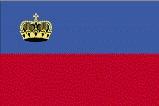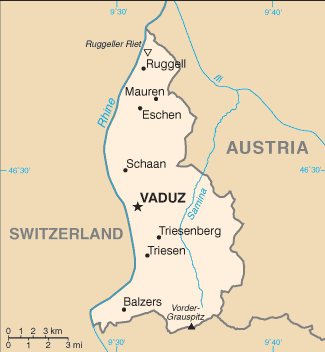|
Liechtenstein
|

|
Capital: Vaduz
Population: 38,019
Brief History of Liechtenstein:
Liechtenstein is a small country located between Austria and Switzerland. It is named after the original ruling family who first gained the fief of Vaduz in 1699 and later added the fief of Schellenberg in 1713. It was the Holy Roman Empire who first gave the country its independent status in 1719.
Liechtenstein was occupied by Napoleon and the French for a few years. Napoleon also founded the Rhine Confederation in 1806 and accepted Liechtenstein as a member. As a result, Liechtenstein has considered itself a free country since 1806.
Liechtenstein has no standing army and maintains neutrality. It declared neutrality in both world wars as well.
The Geography of Liechtenstein
Total Size: 160 square km
Size Comparison: about 0.9 times the size of Washington, DC
Geographical Coordinates: 47 16 N, 9 32 E
World Region or Continent: Europe
General Terrain: mostly mountainous (Alps) with Rhine Valley in western third
Geographical Low Point: Ruggeller Riet 430 m
Geographical High Point: Vorder-Grauspitz 2,599 m
Climate: continental; cold, cloudy winters with frequent snow or rain; cool to moderately warm, cloudy, humid summers
Major cities: VADUZ (capital) 5,000 (2009)
The People of Liechtenstein
Type of Government: constitutional monarchy
Languages Spoken: German (official), Alemannic dialect
Independence: 23 January 1719 (Principality of Liechtenstein established); 12 July 1806 (independence from the Holy Roman Empire)
National Holiday: Assumption Day, 15 August
Nationality: Liechtensteiner(s)
Religions: Roman Catholic 76.2%, Protestant 7%, unknown 10.6%, other 6.2% (June 2002)
National Symbol:
National Anthem or Song: Oben am jungen Rhein (High Above the Young Rhine)
Economy of Liechtenstein
Major Industries: electronics, metal manufacturing, dental products, ceramics, pharmaceuticals, food products, precision instruments, tourism, optical instruments
Agricultural Products: wheat, barley, corn, potatoes; livestock, dairy products
Natural Resources: hydroelectric potential, arable land
Major Exports: small specialty machinery, connectors for audio and video, parts for motor vehicles, dental products, hardware, prepared foodstuffs, electronic equipment, optical products
Major Imports: agricultural products, raw materials, machinery, metal goods, textiles, foodstuffs, motor vehicles
Currency: Swiss franc (CHF)
National GDP: $3,200,000,000
** Source for population (2012 est.) and GDP (2011 est.) is CIA World Factbook.
Back to Geography Home Page
